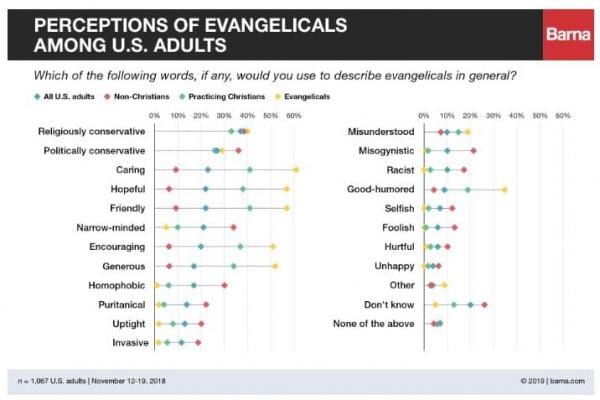Hi and welcome back! I hope you’ve recovered from any lingering food comas, because we’ve got a full plate of wackadoodlery ahead of us today. Two major news stories about Christianity collided in the wackiest possible way this week. One involves a study revealing how narcissistic and lacking in self-awareness evangelical Christians really are. The other has evangelicals themselves confirming that point in mile-high neon letters. Yes, nobody loves evangelicals quite like they themselves do. And I do mean that assertion literally. Today, let me show you the hilarious results of a worldview stripped years ago of the need for feedback.

Some New Evangelical “Research.”
Very recently, Barna Group released a new study. They’re a for-profit business in America that does shoddy research and analysis, then sells the results to desperate evangelical leaders. In the past, we’ve had a grand old time spearing their bizarro-world methodology. The only thing more hilarious than their attempts at research might be their surreal conclusions based upon it all–which lead into even more surreal calls for action directed toward the tribe.
(I know, I know. “Tell us how you REALLY feel, Cas!” But seriously. It’s shamefully bad.)
If you want transparency about methodology out of any of these groups, you’re going to be disappointed. Above all, they’re in this thing to make money. Evangelical leaders don’t spend money on completely bad news. Unfortunately for these ersatz research groups, well-designed studies deliver nothing but completely bad news these days.
Despite their many limitations, though, organizations like Barna Group offer observers a sort of hot-take about how evangelicals feel about various topics. In addition, they also provide us a sense of what their future plans might involve.
So when I heard about their new study, I saddled right up!
And Their SHOCKING Results.
This new Barna study concerns different religious groups’ perceptions of evangelical Christians. Barna asked about 1000 adults from various broadly- and poorly-defined religious groups to rate various descriptors for their applicability to evangelicals. Some of these descriptors were positive, some negative. Interestingly, none seemed strictly neutral and more than a few seemed very emotionally-loaded in one or the other direction.
For example, would a respondent consider evangelicals caring, as a group? How about invasive? Or hurtful? Or racist?
The higher the percentage on their results chart, the more respondents thought that descriptor applied to evangelicals as a group.
The answers Barna received won’t be a major surprise, I don’t reckon.
Here’s their results chart, including the descriptors:

The upshot: People perceive evangelicals very poorly for the most part. The further away from evangelicalism a respondent was, the more poorly they thought of evangelicals.
Barna headlined their story “U.S. Adults See Evangelicals Through a Political Lens.” To them, that was the big takeaway from their work. Shockingly, most people consider evangelicals extremely conservative politically. And indeed, the more conservative respondents were, the more warmly they perceived evangelicals as a group.
SAY IT AIN’T SO!
Shocked, yes shocked we all are!
There’s more to the study than just that info. Oh, so much more. Hilariously, Barna didn’t just ask outsiders to rate evangelicals. They also asked evangelicals to rate themselves.
That’s what makes this study so magically delicious to me.
Aww, Nobody Wuvs Evangewwicaws Ennymore–Except for Evangelicals.
The first thing that sprang out at me upon seeing that chart was how exceptionally poor perceptions were of evangelicals, all the way around.
But the second thing that sprang out at me was how exceptionally amazingly well evangelicals thought of themselves!
Unsurprisingly, absolutely nobody rated evangelicals very highly on any positive descriptor. Well, nobody outside of evangelicals themselves. However, even they couldn’t go too high on any positive descriptor.
Evangelical respondents most highly ranked their tribe as caring. Just over 60% of evangelicals chose that word to describe them. However, that number means that just under 40% of evangelicals thought naah, that isn’t us really, now is it? From there, just over 40% of “practicing Christians” said that caring described evangelicals, while about 25% of respondents in general thought that–and fewer than 10% of non-Christians did.
Moving onward, I saw absolutely no positive descriptors ranked higher than about 20% by respondents generally, and none that hit higher than 10% from non-Christians. When we hit what I call “feelings wheels” of overall impressions, the picture became even more clear:

(Not) Seeing Their Own Flaws.
The way evangelicals fell out regarding negative descriptors interested me as well. Evangelicals almost never thought they fit into any of these negative descriptors:
- Narrow-minded
- Homophobic
- Uptight
- Invasive
- Misogynistic
- Racist
- Selfish
- Foolish
- Hurtful
- Unhappy
When I say almost never, I mean that the little yellow diamond marking evangelical respondents barely moved from the 0% position. About 5% of ’em were willing to go in on narrow-minded, which was seen as a weird positive even back when I was a Pentecostal myself.
Here, as well, we see the pattern from before–just in reverse. The further respondents got away from being evangelical themselves, the more often they thought the negative descriptors fit evangelicals. By the time we reach the red diamonds of non-Christian respondents, evangelicals look really bad.
Believing Their Own Marketing.
Barna, of course, comes out of this survey thinking that non-Christians are just the poor widdle victims of bad marketing meant to make them look bad:
Non-Christians are predisposed to hold negative ideas about evangelicals, favoring adjectives like “narrow-minded” (34%), “homophobic” (30%), “misogynistic” (21%), “racist” (17%) and “uptight” (20%).
Yes, we’re just “predisposed” to dislike evangelicals. That’s unlike evangelicals, whose overwhelmingly positive opinions of themselves are clearly earned through experience.
This is the kind of dishonest two-step Barna pulls constantly about the people their tribe has hurt and alienated. Years ago, I reviewed You Lost Me, which was written by their leader David Kinnaman. He described that huge group similarly then, too. We only “perceived church culture” as being overprotective, shallow, repressive, etc. We didn’t experience church culture as being those things.
Back then, David Kinnaman allowed no room at all for evangelicals to have totally earned their reputation with outsiders. And his group doesn’t allow that room here, either. Non-Christians are simply “predisposed” to dislike evangelicals. Poor widdle evangelicals! That must be part of why almost 20% of them described their tribe as “misunderstood.”
Salvaging a Shipwreck.
Remember, Barna designs their own surveys. Every time, they do so with an eye toward getting back the best outcomes possible. They need those outcomes, because they sell their work to desperate evangelical leaders. I’ve never seen a survey out of any of these Christian groups that didn’t come up with a rosy picture of their future–alongside some bizarro-world suggestion about future tactics that will totally for sure turn the tide of their decline.
And the best Barna can do with their own survey’s results this time?
Gloat that some Americans somehow don’t absolutely hate them after all the time evangelicals have spent wrecking the country:
In addition to those two sides of the ‘Divided States of America,’ an important part of understanding the perceptions of evangelicals is the large percentage of Americans who have no opinion of evangelicals—that is, who express neutrality or no opinion in response to the survey questions. For these adults, there is an impregnable fortress of indifference toward evangelicals. The extreme views (both favorable or unfavorable) dominate the discussion, but the middle ground doesn’t really know what to think about evangelicalism. That’s not a sensational story these days, but it’s an important one.
Looking back at Barna’s “feelings wheels,” neutrality was big, but it wasn’t that huge a percentage. And it was worded as “neutral.” Respondents might simply have felt their positive and negative opinions balanced out overall. Further, their categories–as mentioned–both suck and blow. They only get to that opinion by adding up all their Christian respondents. As always, it’s EVERYONE IN THE POOL whenever dishonest hucksters need their numbers padded. Non-Christians sure didn’t feel neutral at all.
But okay. The fact that even Barna understood that many Americans represent “an impregnable fortress of indifference” does, indeed, matter quite a lot.
How Trustworthy And Useful Is This Study?
In July, Pew released a survey revealing that the more religious knowledge people have, the more poorly they perceive evangelicals. Interestingly, that result reverses the pattern seen everywhere else. The more someone knows about religion, typically the warmer they feel about other religious groups. So to know evangelicals is to dislike them, in a very real way. So this more reputable survey does tally with Barna’s findings.
Barna’s survey also tells us that evangelicals have begun to reckon with their growing irrelevance in modern culture. Oh, they talk about it sometimes. I’ve even seen the odd editorial–like this recent one–trying to reconcile their outsized expectations with their diminishing reality. They’ve made the odd stab at the topic a few times over the past five or six years, but maybe now they’ll get down to it in earnest. Evangelical leaders teach entire sets of expectations that never play out in reality. When we move into the topic of revivals (soon!), we’ll see how exhausting and demoralizing these sorts of disparities are for the flocks.
If Barna and their readers finally understand these two points (that people really don’t like them as a group, and that increasingly we don’t care what they think or want), it’ll go far toward them embracing how tainted their brand really is nowadays.
But this survey won’t change anything. As I see it, they face two humongous problems.
First: A Dealbreaker in Ideological Setup.
As we’ve seen many times before, in broken systems like theirs, evangelical leaders always teach that their message is absolutely perfect. That truth means that evangelicals permit no questioning of their beliefs, much less any meaningful changes to them. And without a serious reckoning with their beliefs and some big changes to their group’s structure and functionality, which includes how they engage with outsiders to their culture, they can’t change their strategies.
That bone-deep rigidity leads us to one of the most important things to know about broken systems:
When an instruction isn’t working to produce desired results, all a broken system’s leaders can do is demand that members do more of it and harder.
These leaders can’t walk back their previous instructions. In this case, evangelicals think a real live god told them to do what they do. If Barna tried to walk that back, that’d mean they either misunderstood their god’s instructions, which is disastrous, or that their god told them to do something that wouldn’t work, which is beyond disastrous. Thus, their leaders maintain both their hold on power and their credibility with orders to do more of it and harder.
This directive also keeps the flocks dancing on the wire. They blame themselves when things go wrong. And they work so hard to do the impossible that they never notice it never works.
Second: Why Evangelicals Can’t See Their Flaws.
Long, long ago evangelicals pared away the feedback of their victims.
Instead, they see us as toddlers in a very literal sense. They don’t view toddlers as having any rights whatsoever, as well as lacking human qualities like rationality and discernment. Because of their views of toddlers, they feel parents have every right to completely dominate and control them–for their own good, of course. Similarly, they see us as lacking essential human rights and even the same human qualities that they themselves possess.
They literally don’t take us seriously when we tell them why we don’t like them. As far as they’re concerned, we only think that because demons oppress (or flat-out possess) us, or because we just don’t understand why they’re trying to hurt and control us.
Because we don’t believe the same nonsense they do, they dismiss our concerns and opinions out of hand. The people who believe the same nonsense they do certainly like them, they think, so if we don’t then it’s purely because we lack the same beliefs they hold. The harder we fight against their overreach, the droopier their preacher eyebrows get in sanctimonious sorrow.
How sad, how very sad they are that they must continue beating us until our salvation improves! If we’d only behave ourselves and bend the knee, they could stop!
Thus, Barna and their fellow fake-research groups will never, ever consider our input regarding their behavior.
The Resulting Dilemma.
Barna’s position–which mirrors those of evangelical leaders generally–is that their tribe is unfairly put-upon and hard-done-by. They’re misunderstood. The big mean ole world sees them as stone-cold racists and bigots, as sexists and controlling hyper-zealots, but dangit, they’re not bad. They’re just Bibled that way.
Above all, Barna Group always tells their customers that they are in the right. Yep! Their culture wars are totally divinely-ordained and -mandated. Eventually, their strategies will totally for sure start working to reverse their decline.
And that idea leads them to strategies that only drill down on what makes people dislike their group to begin with. They can’t engage with the idea that yes, actually, people have excellent reasons for disliking evangelicals. All Barna can do is allude to the idea that evangelicals’ behavior in the public eye affects their sales rates:
Of course, it’s most important that Christians of all traditions, evangelical or otherwise, concern themselves with the reputation of Jesus, not merely the perceptions of evangelicals. Yet, will the public witness of evangelicals be a bridge or a barrier to the very thing they hold most dear: persuading others to put their faith in Christ? The findings strongly suggest that the perceptions of evangelicals are more barrier than bridge on the road to gaining a hearing for the gospel.
And that leads us to the biggest problem Christians have–not just evangelicals, but Christians generally.
The Club Nobody Wants to Join.
This world contains a whole lot of clubs. Some are pretty dang open to new members. Others are completely exclusive. And, too, people see some clubs as being very desirable to join. Others, people wouldn’t join even if they were getting paid to do it.
Evangelicals’ club members imagine their club is totally easy to join as well as welcoming and nurturing. It is neither.
They also flatter themselves by imagining that it is desirable to join and that it is superior to other kinds of social groups. It is, again, neither.
But evangelicals really, really want people to want to join their group. In fact, they measure their success as a group by how many new recruits they sign up for it.
Their product consists solely of membership in that club. They hawk that product constantly. Like multi-level marketing (MLM) shills, they’re “on” 24/7, always on the lookout for a potential downline to recruit. Everything they do, they do it with an eye toward raising their membership numbers. They view those numbers as a tightly-bound barometer of their god’s approval of them as a group.
But fewer and fewer recruits seem willing to entertain evangelicals’ manipulative, dishonest, sleazy sales tactics to join groups they don’t even like in the first place.
The Incorrect Assumption.
The one thing I always get from evangelicals is their impression that all they must do is convince their victims that their claims are true, and that will lead–as night the day–to those victims joining their groups and remaining dues-paying members until death. It’s like they think that if they can just convince us that, say, Creationism is anything but a totally childish wackadoo pseudoscience, we’ll go OMG JESUS IS REAL! WHO KNEW? and drop to our knees to sob out the Sinner’s Prayer, then show up in church every Sunday from then on to be discipled into TRUE CHRISTIANS™–by them, of course. So it doesn’t matter how they act. The “truth” they peddle is what they think matters.
Evangelical Christians behave like they still have the power to force others to comply with their demands. They act like it doesn’t matter how they behave at all because they have something that their victims simply MUST have no matter what.
And that’s just not true.
They face not one, not two, but three hurdles to recruitment.
Only one of them touches on evangelicals’ actual claims.
The Three Hurdles.
The first of those three hurdles, evangelicals can’t help: offering firm, credible, objective support for their claims. No religion offers that.
However, the second hurdle might as well be located on the Moon for all the chance there is of evangelicals clearing it, and that problem matters enormously: offering their marks groups to join that are worth joining, pleasant to belong to and work with, and which represent a return on resource outlay that feels good to members.
Even if evangelicals could demonstrate the truth of their claims, they’d still slam up against how terrible their groups are. Even evangelicals themselves increasingly skip out of evangelical groups.
Look at any evangelical blog post or news story about church attendance (here’s one I found completely at random)–you’ll see loads of evangelicals in the comments saying they’re done with churches because all the ones they try turn out to be drama-infested, zealotry-addled, dishonesty-plagued, power-obsessed cesspits of dysfunction.
So if evangelicals themselves can barely be arsed to attend church and stay dues-paying members of them, that’s going to seriously impact their recruitment rate of new people.
The Demographic Hurdle.
The third hurdle simply involves demographics.
Fundagelical bigots represent a dying demographic. They’re aging in place and newer generations go that route less and less by the decade. So the membership pie shrinks more year by year, with evangelical groups squabbling more and more over its shrinking slices. Remember that “feelings wheel” and how totally non-neutrally non-Christians felt about evangelicals? More non-Christians emerge every single day. The numbers of non-Christians grows now to the point where we’re teetering on the edge of outnumbering Christians in the United States.
And non-Christians do not like evangelicals!
Barna Group can’t engage with any of these realities. So instead, they concentrate on what they can sell to their core customer base: false optimism and bravado, staying the course with their failed marketing tactics, and treating their tribal enemies as poor, misguided toddlers who don’t understand their Designated Adults at all and must be forced to comply for their own good.
As sales strategies go, that one would get the salespeople of any reputable company flat-out fired.
I know I hammer at this point, but it really feels like one of the most important ones I could ever make:
Without regaining their former powers of coercion, evangelicals will never return from their decline. This study only confirms that point.
NEXT UP: Just how caring, hopeful, friendly, encouraging, generous, and good-humored are evangelicals? Maybe we know them better than they imagine we do.
See you soon! <3
Please Support What I Do!
Come join us on Facebook, Tumblr, Pinterest, Twitter, and our forum at rolltodisbelieve.com! (Also Instagram, where I mostly just post cat pictures. About 99% of my insta consists of Bother being adorable.)
Also please check out our recent Graceful Atheist podcast interview! It was a blast.
If you like what you see, I gratefully welcome your support. Please consider becoming one of my monthly patrons via Patreon with Roll to Disbelieve for as little as $1/month! My PayPal is [email protected] (that’s an underscore in there) for one-time tips. You can also support this blog through my Amazon Affiliate link–and, of course, by liking and sharing my posts on social media! Thank you for anything you wish to do.
h/t to the Commentariat and to Friendly Atheist.















